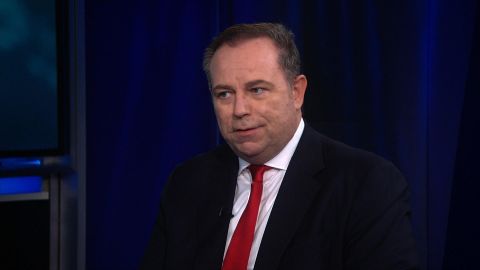Read Transcript EXPAND
CHRISTIANE AMANPOUR: Is there any way that this actually emerges as a process that the American people can sort of buy into?
EZRA KLEIN, AUTHOR, “WHY WE’RE POLARIZED”: Well, the American people are one thing, that’s the first thing about polarization. I will say first as a set up point, I was frustrated by the interview of Mr. Ruddy because there’s just a lot that wasn’t true in it. For instance, there was — within the House resolution that set out the impeachment proceedings in the House, the president could participate in the judiciary committee. They could cross examine and they could do quite a bit. They decided not to participate or similarly, I think, this actually gets to polarization quite directly, it isn’t simply the New Jersey Democrat who switched parties the other day but also, Justin Amash, libertarian Republican. He left the Republican Party after agreeing that impeachment was necessary because he was going to lose a primary challenge if he stuck in it. So, one of the things that you have now is that the parties are sufficiently united in their internal construction, that if you’re going to go against the party on a major issue, you probably will not survive. That isn’t how it used to be. So, it means that what you do is you don’t just have these two parties but you’ve all disagreements sorted across them. And so, if somebody is going to disagree, then you’re often better off changing parties and trying to hold that disagreement it within your party. There are a lot of reasons for that, but it makes it so that it is very, very, very hard to get anything bipartisan on anything, not just impeachment but think about Affordable Care Act or Trump tax cuts or really anything. You’re not going to see people crossing over because it’s very dangerous to do so and because we’ve already authentically sorted so much disagreement that they don’t want to cross over. That’s why they’re a Democrat or that’s why they’re a Republican.
AMANPOUR: Let me ask you to follow up on that. Just to remind everybody, Republicans oppose impeachment, 95-5. This is according to the latest Quinnipiac Poll. Democrats support impeachment 86-11. You know, in terms of trying to figure out which way it’s going to go, what — I mean, what will be the consequence after the Senate process?
KLEIN: I don’t think we know the answer to that. So, I think it is pretty clear, the Senate is not going to muster a two-thirds majority to remove Donald Trump from office. Impeachment requires not just a majority but super majority, and there’s no real chance of the president’s critics getting that. I do think you’re looking at something quite different, at least in its political ramifications if you see a couple of Republicans break ranks and vote to impeach the president and so, say, it’s 52-48 vote for impeachment. That would not lead to removal but it would be, I think, seen as one way rather than another by the country. Some of these are distinct about this impeachment process, is that it’s happening in the first term of the president’s tenure. So, for both Bill Clinton and Richard Nixon, it was coming in the second term. They were not going to face the voters again. So, impeachment, to the extent that people felt there needed to be a reckoning for what they had done. Impeachment was really the only approach to it. In this case, the Senate is not the only judge that President Trump will face next year or at least not the only jury, maybe more to the point. He’s also going to have an election.
About This Episode EXPAND
Christopher Ruddy talks impeachment, Ezra Klein discusses his new book “Why We’re Polarized” and Jonathan Pryce explains his role in “The Two Popes.” Plus, comedian Ronny Chieng tells Hari Sreenivasan about his work on “The Daily Show,” “Crazy Rich Asians” and his new Netflix comedy special.
LEARN MORE



